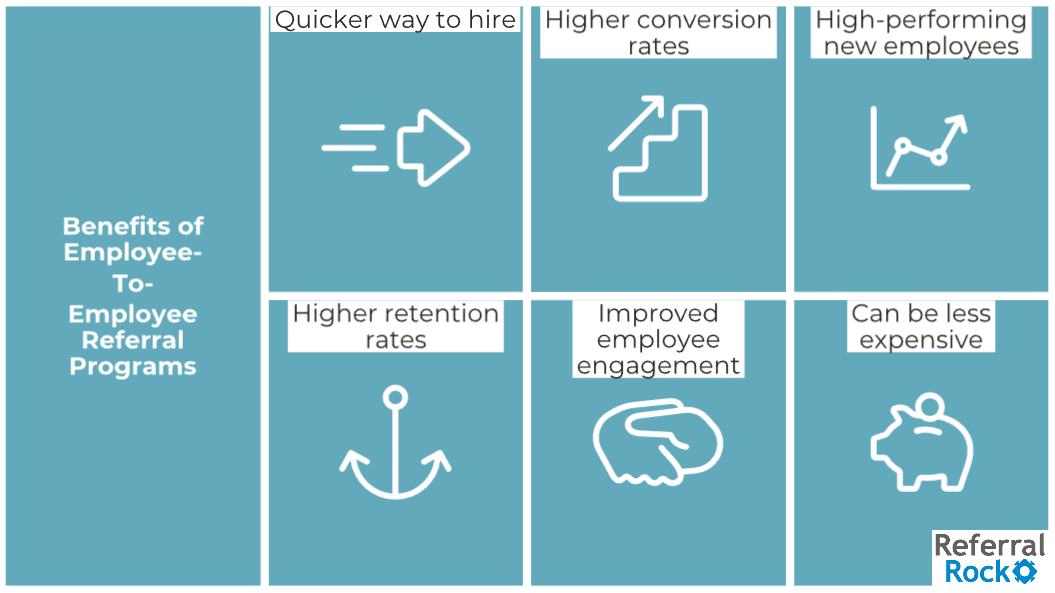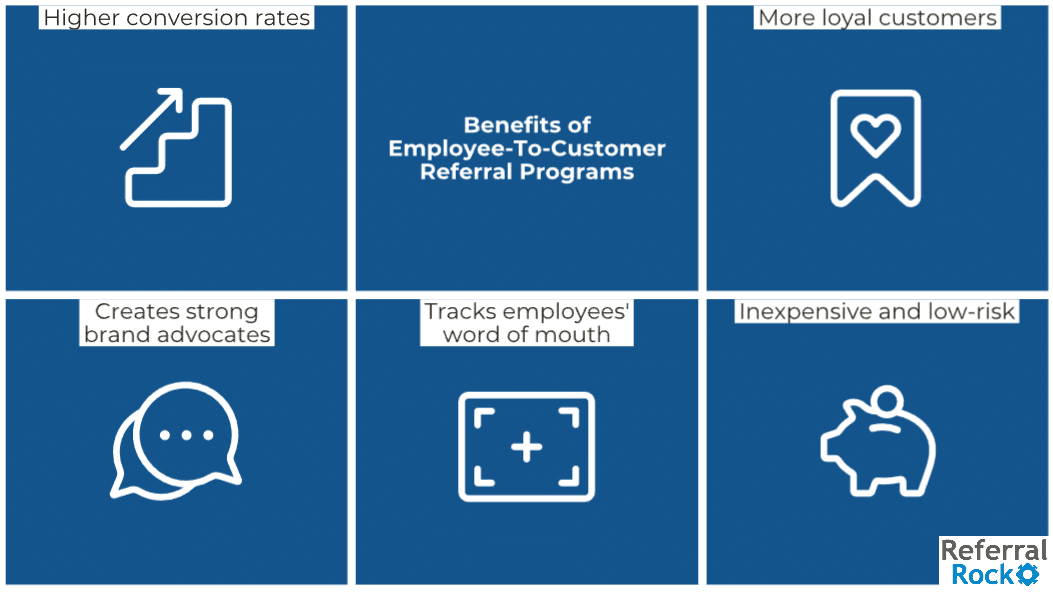Employee referral programs have plenty of benefits that you shouldn’t sleep on. They are an effective way to grow your customer base and onboard new staff members. By incentivizing current employees to refer potential candidates, these programs can also reduce the time needed for recruiters to source qualified individuals as well as cut down on recruiting costs. And if you’re looking for new customers, employees are some of your best brand advocates.
In this article, we will discuss the benefits of employee referral programs, and how to decide if one is right for your business.
What is an employee referral program?
An employee referral program is a formal process where companies incentivize current employees to bring in new business or refer qualified talent. When successful referrals occur, the referring employee is rewarded with incentives such as cash, tangible items, travel rewards, or event tickets.
These programs utilize employee referral software, which allows staff members to create and share personalized links with prospective customers or applicants they feel would be suitable for a given role. The employee referral software tracks the sharing, so businesses always have visibility into the progress of the program.
Types of employee referral programs
Employee referral programs can be broken down into two types: employee-to-employee referral programs and employee-to-customer referral programs.
Employee-to-employee referral programs encourage current staff members to refer qualified candidates for open positions at the company. When their referrals apply, interview, and/or get hired, the referring employee is rewarded with incentives such as cash or tangible items.
Employee-to-customer referral programs incentivize employees to refer potential customers to the business. When a person they refer makes their first purchase or signs up for a service, the referring employee is rewarded with incentives.
Benefits of employee referral programs: Employee-to-employee
There are many advantages to implementing an employee referral program for finding new talent. Some of these benefits include:
You can hire employees more quickly
Having employees directly refer candidates takes far less time than releasing job postings and filtering through applicants.
Employees are best placed to judge if someone is a good fit for your company, has the right skills, and aligns with your company culture. This becomes increasingly important in hard-to-fill roles, where you may struggle to find suitable candidates if you use other sources. You might not find many applicants for these roles on a job board, but an employee with similar skills might know someone within the profession.
With an employee referral program, you can use rewards to encourage your employees to share job openings quickly and efficiently with their professional networks. And if you have notifications set up to share openings promptly, the prospect of a reward could speed up the hiring process even more..
Referred applicants are more likely to convert
Referred applicants have higher conversion rates. They are more likely to accept a job offer due to their already existing connection with an employee at the company. This can be helpful in reducing time spent interviewing unsuitable applicants, as well as ensuring that you find the right people for the role faster.
Overall, employee referral programs can be a great way to find qualified and motivated candidates so you can get the right people into your team as soon as possible. This can help ensure that job openings are filled effectively and efficiently, saving time and money in the long run.
Referred employees are high performers
Referrals are also the best source of high-quality hires compared to career sites and job boards, meaning referred hires tend to deliver top-notch performance. Referred employees have already been vetted through their network, making it more likely that they will be competent in their field and motivated to perform at a higher level.
Not only does hiring referred employees come with a high-quality guarantee, but it can also be cost- and time-effective. Referred employees may require less training (meaning they’ll start delivering results more quickly). After all, they’re prequalified and often have a built-in mentor in their peer. This cuts the costs of lengthy onboarding processes.
Referred employees have higher retention rates
One of the key advantages of employee referrals is that referred employees are more likely to stay with the company longer than other sources of recruitment.
After two years, retention rates remain higher for referred employees at 45%, whereas those hired from job boards have only a 20% retention rate.
This makes perfect sense – people who are referred by their peers feel more secure in their position, knowing that they have a peer who is invested in their success and able to show them the ropes. The connection also helps build trust between the new employee and the company, which translates into loyalty. In fact, some employee referral programs report that referred employees are 350% less likely to be let go due to better employee fit and performance.
This makes an employee-to-employee referral program a great way of building a foundation for a long-term relationship with new hires. Investing in such a program can lead to higher retention rates and more committed employees. So if you’re looking to grow your team with reliable talent, this is definitely an avenue.
Referral programs improve employee engagement
Employee-to-employee referral programs provide employees with a unique opportunity to actively participate in the success of their company. Through these programs, employees are asked to recommend other qualified professionals for positions within the organization, creating a sense of ownership and pride in their contribution. Employees feel more valued when they have an active role in the recruitment process, knowing that their input is important to the company’s success.
Furthermore, offering rewards through employee referral programs encourages employees to get involved in building up the company brand. This can lead to greater engagement among staff members. In addition, it creates a better working environment, since employees have helped their friends find opportunities with you.
Referral programs can be less expensive than other recruiting methods
When it comes to recruiting new talent, utilizing employee referral programs can be a cost-effective alternative to traditionally expensive methods such as hiring recruiters or paying for job site listings. The main costs associated with an employee referral program are the software used to create the links, and then the incentives for employees when their referrals are successful. You decide the incentives you offer employees, and the time you pay them. You can pay out the rewards when a new hire is made, when an individual is called for an interview, or after a newly referred employee stays for 30 days. This cost-effective approach offers employers a great way to expand their recruitment pool and bring in new talent.
Benefits of employee referral programs: Employee-to-customer (Finding new business)
In addition to employee-to-employee referral programs, many companies are now offering employee-to-customer referral programs. These programs offer unique advantages for your company, including the main ones below.
Employees’ referrals are more likely to produce purchases
It’s no secret that people trust recommendations from those they know above all else. Customers trust the recommendations of their peers far more than ads and marketing efforts from a company, meaning that referral programs produce higher conversion rates.
When your own employees refer customers to you, those customers are far more likely to actually purchase from you than if they had come across your brand through another avenue. Not only does this show that referrals from people in the know can be incredibly powerful for businesses, but it also speaks to the importance of engaging and incentivizing your staff to get involved in customer referrals. With the right referral program in place, your employees can help you drive more sales simply by encouraging their own connections and contacts to do business with you.
Referred customers are more loyal
Referred customers are more likely to make repeat purchases, meaning they have greater customer lifetime value (CLV).
With an employee referral program in place, you can reap the rewards of increased customer loyalty without having to spend money on additional marketing efforts.
You’ll turn employees into strong brand advocates
Employees who understand the mission and values of your company, along with the value of your products, are prime candidates to become brand ambassadors. They’re in a unique position to explain these aspects to others in a language that their peers will easily comprehend. By turning employees into strong brand advocates, you create an added layer of trust in the eyes of potential customers and demonstrate that your company is committed to the success of its employees.
Not only does this encourage employees to keep up their advocacy activities, but providing recognition can also strengthen morale and foster positive relationships between your team and customers. This in turn can lead to higher customer acquisition and retention rates, increasing loyalty and brand recognition both internally and externally.
You gain an easy way to track employees’ word of mouth
Employee advocacy can often be difficult to quantify and measure, making it hard to assess its impact. Implementing an employee-to-customer referral program gives you an effective way to track your employees’ word-of-mouth recommendations.
By providing a unique referral link for each of your employees, you’ll be able to measure the number of shares and conversions that come as a result. This allows you to accurately track the reach and influence of your employee advocacy efforts, while also providing an instant incentive whenever employees successfully promote your business.
These referral programs are inexpensive
An employee-to-customer referral program is an effective and cost-efficient way to attract new customers. Compared to traditional marketing campaigns such as advertising, employee referral programs are significantly less costly. The only costs associated with these programs are the software used to track referred customers and the rewards paid out when referred customers make purchases. Companies have complete control over the amount spent on rewards in order to stay within budget. Employee referral programs typically have a high rate of return on investment, making them an attractive option for growing businesses.
These programs are also low-risk
Employee referral programs are performance-based, meaning businesses only have to pay out incentives when they receive tangible results. This makes it a much lower risk than other forms of marketing such as print or digital advertising, which require an upfront cost whether there is any return on investment or not. Businesses can use this low-risk approach to attract potential customers without the fear of not seeing any return on their investment.
Which type of employee referral program is right for you?
Employee referral programs can be a great way to find qualified talent for your business. Whether you’re looking to recruit new employees or introduce new customers to your products and services, employee referral programs offer numerous benefits.
However, it’s important to consider whether an employee-to-employee or an employee-to-customer referral program is right for you. Even though employee referral programs offer lots of benefits, you’ll only reap those benefits if you’re ready for one. Properly assess your business needs before committing.
An employee-to-employee referral program usually only works well for larger businesses, which have lots of employees and have open positions they need to fill regularly. (Employee-to-employee referral programs aren’t worthwhile for every business; in particular, they aren’t worth it for small businesses to set up.)
In addition, make sure that:
- Your employees are highly engaged and satisfied with your company
- Your employees understand your brand’s culture
- Your employees know what makes an ideal employee
- You have an idea of the incentives that will motivate your existing employees to refer potential candidates
An employee-to-customer referral program can work well for most business types, including small businesses.
But you’re only ready for this type of program if:
- Your employees are highly satisfied
- Your employees know your products or services well
- Your employees understand who your ideal customers are, so they can refer people who fit that profile
- Your business is prepared to handle an influx of new customers
- Your business is equipped to provide standout customer service even with this influx.
- You know what incentives will motivate your employees to refer potential customers
Pro tip: Employee-to-customer referral programs work well for businesses of all sizes (as long as they meet the above criteria), so you’re more likely to be ready for this type of program.
But if you’re not ready for either type of employee referral program, you might be ready for a customer-to-customer referral program, where your customers are rewarded for referring their friends to your business.
Wrapping up
Employee referral programs are an effective and cost-efficient way for businesses to attract new customers and talented employees. These programs offer numerous benefits, such as improved employee engagement, lower risk of failure, and a high rate of return on investment.
Referral Rock is the best employee referral software available to help businesses manage their programs, whether you’re aiming to recruit talented employees, attract more customers, or both With a comprehensive suite of features, employee referral program templates, and easy-to-use analytics, Referral Rock makes it simple to create successful employee referral programs. Contact us today to learn more about leveraging employee referrals for success.





